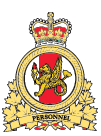Views and Opinions
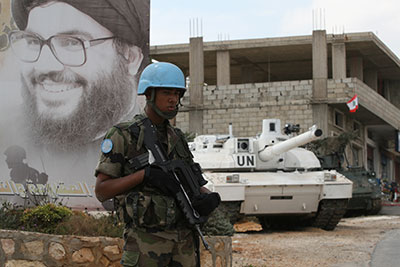
Reuters photo RTR1I4XX by Ali Hashisho
A French UN peacekeeper stands guard in front of a poster of Hezbollah leader Sayyed Hassan Nasrallah at a checkpoint in Adaisy village near the border with Israel in south Lebanon.
How successful has the United Nations Interim Force in Lebanon (UNIFIL) really been in preventing hostilities between Israel and Hezbollah?
by Richard St. John
For more information on accessing this file, please visit our help page.
I have just read the article After Afghanistan: Canada’s Return to UN Peacekeeping by Professor Michael Byers in Vol. 13, No. 1 of the Canadian Military Journal. I will not take issue with the central argument of his article, other than to say that Canada should not undertake any military mission that is not in Canada's national interests, however defined, and should only do so when there is a reasonable chance that the mission will be successful.
I will take issue with one statement: "Since 2006 [i.e. since the summer war between Israel and Hezbollah, the Lebanese Shia terrorist group], UNIFIL [the United Nations Interim Force in Lebanon] has successfully prevented a return to all-out hostilities between Israel and Hezbollah." This assertion, unadorned by any supporting argument or evidence, cannot stand unchallenged. The statement is, in my opinion, dead wrong.
I was the Canadian Defence Attaché to Israel from 2004-2008, and so was intimately involved in Canada's effort to evacuate Canadians from Lebanon during the 2006 war, by being the interface between the Government of Canada and the Israel Defence Forces. [This is not in error - it is Israel, not Israeli, Defence Forces] And I was the front-line war analyst and reporter for the Government, since I was the Canadian who attended all the IDF briefings given to defence attachés about the war's progress. Since my departure from Israel, I have very closely monitored events in the region, not least the cold peace that exists between Israel and Hezbollah.
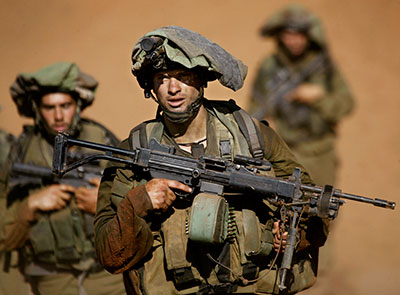
Reuters photo RTR1GE1A by Carlos Barria
Israeli soldiers return from Lebanese territory during the second day of a ceasefire near the town of Avivim, 15 August 2006.
To raise the first and most obvious objection to the author's statement, if UNIFIL has prevented another Israel-Hezbollah war, why did UNIFIL not prevent the 2006 war? While UNIFIL was ‘beefed-up’ after the war, what is so fundamentally different about it now that it has succeeded where the smaller UNIFIL signally failed, if failure it was? The author does not tell us.
Whatever UNIFIL's contribution to the peace since 2006, it is far, far less than that of fear; both Israel and Hezbollah are deterring each other from going to war again.
Israel fears Hezbollah. Israel is deterred by Hezbollah because it knows that another war will see a far greater number of rockets and missiles being fired at Israel than in 2006, of which many will inevitably get through. In 2006, Hezbollah rockets killed numerous Israelis and did considerable damage to northern Israel; one-third of Israelis living within range of Hezbollah rockets evacuated to the south.
Hezbollah now boasts a rocket and missile inventory that, according to Israeli Defence Minister Barak, stands at 75,000, or some five times more than Hezbollah had in 2006. Even with a high success rate from the Iron Dome and Patriot interceptors, Israel's anti-rocket and anti-missile defences will simply be swamped. Israeli casualties will be higher, perhaps much higher than in 2006, and the damage done will also be greater.
Moreover, Hezbollah may also have some Scud guided missiles, courtesy of Syria, with which it can strike anywhere in Israel. The Israeli nuclear facility at Dimona is an obvious target, although Patriots may prevent any successful attack on it. Hezbollah has recently boasted it has the capability to hit any target in Israel; unlike in 2006, when no Hezbollah missiles hit Tel Aviv, it is certain that Hezbollah could do so today. [On the first night of the 2006 war, the Israeli Air Force destroyed all of the several dozen long-range Hezbollah missiles, the only ones Hezbollah had that were capable of reaching Tel Aviv. It is not known whether Israel will be able to pull off a similar and equally remarkable intelligence coup in any new war.]
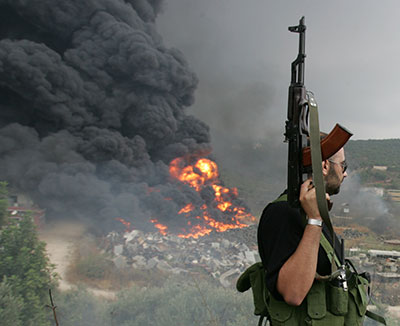
Reuters photo RTR1FKUI by Issam Kobeisi
A Lebanese Hezbollah guerrilla observes a fire rising from a burning object in a Beirut suburb, 17 July 2006.
Israel is thus very afraid of what Hezbollah will be able to do in another war, and so does not want to start one, save in the case of a pre-emptive strike, either because they fear Hezbollah is about to attack, or possibly in the case of having intelligence that Hezbollah is starting to get chemical weapons from Syria. The Israeli fear factor will go even higher if Hezbollah gets chemical weapons. In fact, I believe both Hezbollah and Syria are very worried that the Israelis could be prompted to strike should Hezbollah get them, which is why I believe that this has not occurred, at least not at the time of this writing. That Israel is prepared to act was demonstrated on 30 January of this year, when it attacked a convoy headed to Lebanon from Syria reportedly transporting advanced surface-to-air missiles destined for Hezbollah.
Israel is thus deterred by Hezbollah, and UNIFIL has nothing whatsoever to do with this. UNIFIL has signally failed to halt Hezbollah re-armament since 2006. UNIFIL cannot do anything about the smuggling north of the Litani River, since it is not deployed there. But UNIFIL also will not enter towns and villages south of the Litani without an escort of Lebanese troops, which effectively means the Lebanese Army has a veto on any UNIFIL attempt to deal with Hezbollah weaponry being brought into the area.
Because the Lebanese Government (that part that is not Hezbollah) and many Lebanese people are so afraid of Hezbollah, the Government does not want UNIFIL to have unfettered access to towns and villages to get at Hezbollah weapons. Hezbollah has switched its deployment strategy since 2006; prior to the war, Hezbollah rocket sites were largely based in rural areas. They are now largely in urban areas, in part to ensure more Lebanese civilian casualties, more schools and mosques being destroyed, and so on, in another war, thus aiding Hezbollah’s propaganda efforts. There have been almost no seizures of Hezbollah weaponry since 2006 by UNIFIL.
In fact, I believe not only is Hezbollah deterring Israel, I think it is deterring UNIFIL as well, since no troop-contributing nation in UNIFIL is really prepared to go to war with Hezbollah to try to disarm it. Indeed, it did not take long for the UN to make clear its unwillingness to disarm Hezbollah or to prevent weapons being smuggled to it. On 27 August 2006, the UN Secretary-General said that UNIFIL would not intercept arms shipments from Syria, unless requested to do so by Lebanon. Few if any such requests have been made.
And Hezbollah? Hezbollah fears Israel greatly. Hezbollah is deterred from war by Israel, because it is very afraid of what Israel will do in the next war. Israeli officials and politicians have made it very clear publicly that Israel will conduct a very different kind of war the next time. In 2006, the Israel Defence Forces obeyed an Israeli Cabinet directive that Lebanese infrastructure was not to be harmed (something not widely known or appreciated), except for that infrastructure which could aid Hezbollah directly in its military efforts. So, for example, Beirut's airport was hit to prevent Iran or Syria from using it to re-arm Hezbollah during the war.
In the next war, the Israelis will knock out all important Lebanese infrastructure sites, probably within a couple of days into the war. IDF reservists will be mobilized, in the tens of thousands, and three-or-four IDF mechanized divisions will roll north into Lebanon. We can expect IDF forces to operate from the start in Hezbollah’s Bekaa Valley stronghold. With the lights literally turned out all over Lebanon, Israel will proceed to grind Hezbollah to military dust; Israel will be deaf to the inevitable international pleas to cease fire.
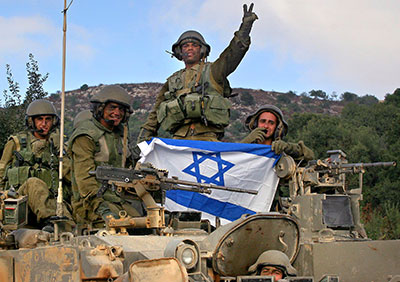
Reuters photo RTR1GD88 by Yonathan Weitzman.
Israeli soldiers hold their national flag after returning from Lebanon, near the Israeli-Lebanese border, 14 August 2006.
All of this can be expected, because no Israeli politician of any stripe would want a repeat of the indifferent results of Israel's military operation of 2006. No Israeli politician could survive if the result is anything less than the military defeat of Hezbollah. Incidentally, though it is commonly believed otherwise, the IDF in fact scored some impressive military successes during the war, such as destroying all of Hezbollah’s long-range missiles on the first night of the war, as noted above. Still, the overall result of Israel's military effort in 2006 has been accurately described as failure, but not defeat.
Nasrallah knows what Israel is going to do if there is another war. He also knows that the Lebanese people will punish Hezbollah very badly if its military adventurism leads to another war. Indeed, Nasrallah said famously after 2006 that if he had known what the Israeli reaction was going to be, Hezbollah would never have carried out the kidnap operation that sparked the war.
All this explains why Hezbollah, though re-arming ‘to the teeth’ and hence deterring Israel, has not fired one shot at Israel since 2006. Not a single one. They may have been behind a couple of terrorist attacks elsewhere, but for the Israelis - at least if there are not too many casualties in such attacks - that is within the current 'rules of the game', just as Israeli assassinations of Hezbollah operatives like Mugniyeh are part of the game, rules which do not include going to war for acts carried out outside Lebanon and Israel, with the possible exception of deniable assassinations by Israel in Lebanon. The only thing that Hezbollah has done is carry out its relatively-recent unarmed drone stunt. Even doing that was probably with no little trepidation on Hezbollah’s part. They did not claim the drone 'victory' until a week later, although they were quick to admit that they expected Israel to shoot it down, which is what happened.
The Hezbollah propagandists then ‘went way overboard’ about the drone stunt. They actually posted a photo of a UAV with a Hezbollah logo cropped into it - except that it was clearly a US UAV, because you could clearly see the US emblem still in the photo on the aircraft. The IDF’s reaction to the drone, aside from shooting it down? Israeli fighters flew over Beirut the next day, breaking the sound barrier and creating sonic booms. However, the Israelis did not pull any triggers, because Israel is still deterred by Hezbollah.
Meanwhile, after a short post-war pause, Israel resumed reconnaissance flights over Lebanon to keep track of Hezbollah military moves and sites. Hezbollah has not fired one shot at them. Not one. UNIFIL's contribution? Counting the number of flights and lodging protests.
Hezbollah is thoroughly deterred by Israel, because Hezbollah knows the next war is going to turn out very badly for Hezbollah and all of Lebanon. Not because UNIFIL is in the way; to Hezbollah and Israel, UNIFIL will be at most a minor annoyance.
For these reasons, I simply cannot accept Professor Byers's statement. It ignores utterly the powerful and dominant fear factor, the factor which since 2006 has been the reason why Israel and Hezbollah have not gone to war.
In the next war, in light of the death of four UN military observers in 2006, UNIFIL will, I believe, pull its troops out of the more exposed posts into as few sites as possible. Indeed, troop-contributing nations may choose to pull their troops out of Lebanon altogether, if they think they can do so without being caught in the crossfire. They will thus not even be able to record most of the events taking place.
So UNIFIL's ‘track record’ since 2006 has not been a good one. Mutual deterrence - great fear - has kept another war from breaking out, not UNIFIL's presence or activities. UNIFIL has not stopped Hezbollah from re-arming. UNIFIL cannot stop IDF over flights of Lebanon. And UNIFIL will not even be able, in my opinion, to play the role of recording current history during the next war, if there is one.
Colonel (ret'd) R. Geoffrey St. John, MSM, CD, formerly an Intelligence Branch officer, was the Canadian Defence Attaché to Israel from 2004 to 2008, and Chief of the Middle East / North Africa Section at Chief of Defence Intelligence, National Defence Headquarters from 2010 to 2011.
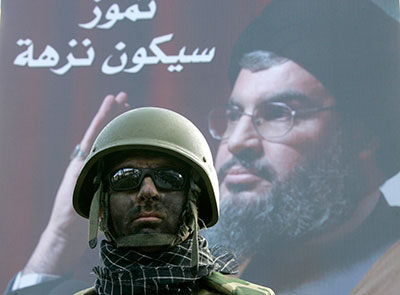
Reuters photo RTR238th
Hezbollah member stands in front of a poster of his leader, Sayyed Hassan Nasrallah, during a procession held to celebrate Ashura in south Lebanon, 10 January 2009.





